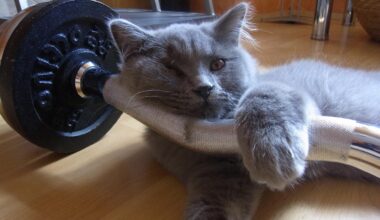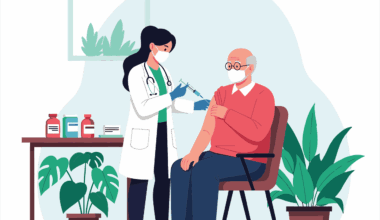Understanding Gingivitis and Periodontal Disease in Senior Cats
Gingivitis and periodontal disease are common oral health conditions that can affect senior cats. As cats age, their oral hygiene often deteriorates, making them more susceptible to dental issues. Gingivitis is the inflammation of the gums, which can be a precursor to more severe problems like periodontal disease. Symptoms can include bad breath, swollen gums, and difficulty eating. Regular veterinary check-ups are crucial for early detection and management. Addressing these issues early can save your cat from pain and discomfort. Dental care is often overlooked but is essential for your cat’s overall health. Cats with periodontal disease may experience tooth loss and other systemic health problems. It’s vital to educate yourself about the signs and preventive measures for cat dental care. Professional cleanings and at-home dental routines can significantly improve your cat’s health and well-being. Additionally, a balanced diet contributes to better oral health. Always consult with your veterinarian to establish the best dental care plan for your senior cat. A little effort can lead to a healthier and happier life for your feline friend.
In addition to regular dental check-ups, being vigilant about your cat’s oral habits is vital. Experience shows that many common behaviors can lead to serious dental issues. An often-overlooked factor in cat dental care is their diet. Feeding your senior cat high-quality, dental-friendly food can mitigate plaque buildup. You may also want to incorporate dental treats designed to reduce tartar and encourage chewing. When choosing food and treats, always check for veterinary endorsements. Knowing which ingredients promote dental health can make all the difference. Consulting with your veterinarian can help in selecting the best options for your furry companion. Regularly brushing your cat’s teeth is another essential component of oral health. Though it might initially seem difficult, establishing a routine can lead to successful teeth brushing sessions. Start slow and use cat-friendly toothpaste. This process can become a bonding activity between you and your cat. Furthermore, dental toys are also a great way to keep your cat’s teeth clean and healthy. Encourage playful chewing activities that can help keep their gums stimulated and teeth strong. Reassess your cat’s dental health frequently as they age.
Signs of Gingivitis and Periodontal Disease
Recognizing the signs of gingivitis and periodontal disease is crucial for early intervention. Some common indicators include persistent bad breath, swollen or bleeding gums, and changes in eating habits. If your senior cat has begun to avoid hard food or is eating mostly wet food, that could signal dental pain. Observing changes in behavior, such as agitation while eating or excessive pawing at the mouth, is another sign to note. As a responsible pet owner, you should regularly inspect your cat’s mouth. Exposure of the tooth roots, significant tartar accumulation, and gum recession are all signs that should prompt a veterinary visit. If you notice any of these symptoms, it’s important to act quickly. Early diagnosis often leads to more effective treatment. Furthermore, delayed intervention can result in more severe health issues and increased veterinary costs. Maintaining dental hygiene is an ongoing responsibility, and it becomes even more critical as your cat ages. Hence, an understanding of the signs will help in managing dental diseases effectively. Spreading awareness can empower other cat owners to take charge of their pet’s dental care.
When it comes to treatment for gingivitis and periodontal disease, individual cases may vary significantly. Your veterinarian may recommend a professional dental cleaning as the first step, especially if your cat is already suffering from advanced stages of gum disease. These cleanings remove tartar and plaque buildup that regular brushing cannot address. Depending on the extent of the disease, teeth extractions may also be necessary to alleviate pain. The recovery period after such procedures requires special care and often involves administering medications. Providing a soft diet can greatly help during this time. Some veterinarians may suggest dental rinses or oral gels to manage and control oral bacteria in conjunction with regular dental care. Once the initial treatment is completed, establishing a rigorous at-home dental routine becomes essential. Continuing to brush your cat’s teeth and providing dental treats will promote long-term oral health. Ask your veterinarian for demonstrations and recommendations customized for your cat’s specific needs. Follow-up check-ups will help monitor the condition and make adjustments to the care plan as necessary. Always stay informed about your cat’s health to ensure they remain pain-free.
The Importance of Regular Veterinary Visits
Veterinary visits become increasingly vital for senior cats in managing dental health. As a cat ages, their risk for various health problems multiplies, including dental issues. However, many pet owners often underestimate the importance of annual check-ups, sometimes skipping them entirely. Regular veterinary visits incorporate dental examinations, where professionals can identify and address issues early on. During these appointments, dentists can provide personalized advice on tooth brushing techniques and dietary recommendations specifically for dental care. In addition, having your vet perform dental cleanings and examinations significantly helps keep your cat’s oral health in check. They have access to equipment and expertise that can identify problems inaccessible to the average pet owner. This thoroughness means that problems like gingivitis can be detected during their early stages, leading to better outcomes. By investing time and resources into these regular veterinary visits, you are taking proactive steps to ensure your cat’s long-term health. Ensuring that your furry friend remains as healthy and happy as possible is a worthy goal that can largely be achieved with veterinary support.
One of the lesser-known impacts of poor dental health in senior cats is its potential influence on overall well-being. Research has shown that infections and inflammation in the mouth can contribute to other systemic diseases, such as kidney disease and heart conditions. The bacteria accompanying serious periodontal disease can enter the bloodstream, affecting vital organs. This interrelation emphasizes the need for diligent oral care, particularly in senior felines. Therefore, understanding the connection between oral health and overall wellness is essential for providing comprehensive cat care. This knowledge equips pet owners with the information necessary to prioritize dental health appropriately. Emphasizing prevention, such as routine brushing and dietary choices, will help mitigate these risks. You might consider using an array of dental care products designed specifically for cats. Oral health has a significant role in enhancing your cat’s quality of life. This perspective should guide your approach to preventive care, keeping your cat’s physical condition in mind. Beyond just their teeth, your cat’s happiness and longevity rely heavily on proper dental care. Consistent attention ensures your cat continues to thrive throughout their senior years.
Conclusion: Prioritizing Cat Dental Care
In conclusion, prioritizing dental care for senior cats is essential to ensure their long-lasting health and happiness. Pets age similarly to humans and face many challenges, including dental issues. As a responsible pet owner, making informed decisions on dental routines can significantly impact your senior cat’s quality of life. Invest time in educating yourself about the conditions affecting feline dental health. Understand the symptoms to look out for and establish regular veterinary appointments. Early intervention is key to preventing severe diseases associated with poor dental hygiene. Customizing a dental care routine involving brushing, diet, and professional cleanings can lead to remarkable improvements. A proactive approach is the best way to reduce the risk of gingivitis and periodontal disease. Observe your cat’s patterns and engage with their specific dental needs. By working closely with your veterinarian, you can create a holistic approach to your cat’s overall well-being. Remember, a healthy mouth contributes to a happier life for your feline friend. Make dental care a priority to enjoy many more years with your beloved pet.


